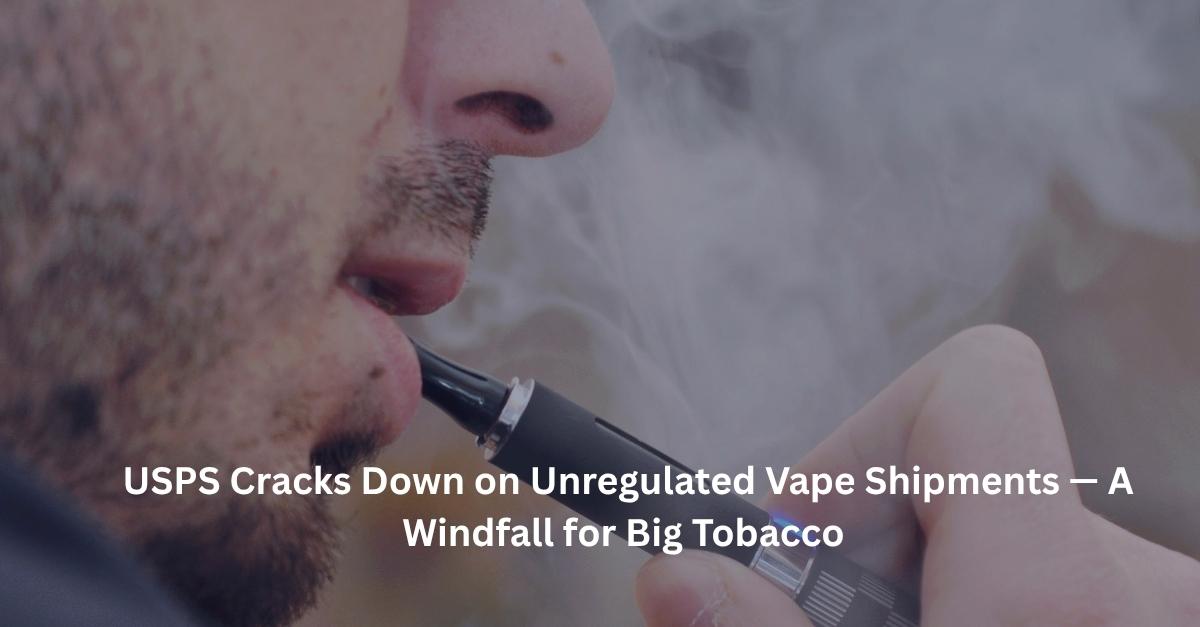11th August 2025, United States
Background
The United States Postal Service (USPS) officially barred New York City-based electronic cigarette retailer Demand Vape from using business mailing services on August 11, 2025, after the company was accused of being involved in sending unauthorized vaping products. The enforcement followed a law referral by the Law Department of New York City, which provided documentation such as invoices and shipping records showing that the company illicitly sold flavored vaping products under federal and city regulations.
In particular, these items were:
- Not approved by the U.S. Food and Drug Administration (FDA), a legal requirement to sell and distribute in the U.S.
- In contravention of New York City’s flavor ban, which bans the sale of flavored tobacco and vape products.
This is one of the strongest enforcement efforts to date by the USPS in the vaping market and demonstrates a continued commitment to closing down illicit trade in the vape market.
Market Context & Strategic Importance
The USPS crackdown comes at a pivotal time for the vaping industry:
- The illegal vape industry in the U.S. is worth around $8 billion, a huge percentage of total e-cigarette sales.
- A vast majority of the goods retailed via convenience stores, gas stations, and websites are imported, flavored, and non-FDA-approved—therefore, unauthorized under U.S. law.
- Law enforcement has been behind in the past, but the federal, state, and local governments are now stepping up coordination to drive out illegal players.
For the USPS, which had itself been criticized in the past for lack of engagement in vape regulation enforcement, this move is a significant move indicating increased postal compliance expectations and a new battleground in anti-illicit trade policy.
The crackdown would substantially reorganize the competitive environment, pushing small or gray-market participants out and rewarding established tobacco players like Altria Group and British American Tobacco (BAT) that have followed FDA routes and made large investments in compliance.
Implications for Stakeholders
For Unauthorized Vape Distributors
- USPS has successfully closed a low-cost, critical distribution pathway. USPS-less distributors will have to use private logistics companies, which incur a lot of shipping expenses and may also charge compliance fees.
- This may lead to increased product prices, reduced margins, and even business closures for small, non-compliant operators.
- USPS has allegedly provided a list of other vape distributors with mailing exceptions to NYC officials, suggesting that further enforcement is likely.
For Regulators
- This represents a rare alignment between federal logistics infrastructure and local health enforcement. USPS and NYC jointly acted upon documented evidence setting a precedent for cooperation.
- The case offers a framework for how other states or municipalities might trigger federal logistics interventions.
For Big Tobacco Companies
- This is a competitive bonanza. FDA-compliant brands such as Altria’s NJOY and BAT’s Vuse no longer have to contend with competition from illegal flavor imports.
- The firms have always maintained that the spread of uncontrolled products adversely affects public health and their own market share. The USPS action is consistent with their long-term lobbying policy objectives.
For Consumers
- The crackdown will likely reduce the availability of low-cost, flavored vape products, particularly among youth and underserved markets where flavored disposables are popular.
- Consumers may see price increases or limited availability as retail channels shift to carry only compliant products.
- There is concern that some may switch back to combustible cigarettes, which remain more widely available.
Company Reaction
Demand Vape has strongly objected to the USPS action, characterizing the decision as “unfair and disproportionate.” The company maintains it is a “transparent, lawful, and reputable business” and argues that the vape market is plagued by regulatory uncertainty, making compliance confusing and operationally difficult.
Demand Vape contends that:
- They did not knowingly ship unauthorized products.
- The regulatory environment is a “grey zone” where the standards are inconsistently enforced.
- USPS acted without providing a sufficient opportunity to respond to the allegations.
Despite this, no legal injunction or appeal has been reported yet.
Enforcement Trends & Regulatory Environment
This USPS action is part of a broader federal crackdown that includes:
FDA warning letters issued earlier in 2025 to 24 U.S.-based vape distributors over non-compliant products. Growing Customs and Border Protection (CBP) vape import seizures at ports of entry in the U.S. Continued actions by the FDA to remove products that failed to go through the PMTA (Premarket Tobacco Product Application) process, as required under the Tobacco Control Act. These kinds of products tend to be colourful, flavor-infused, and throwaway and are appealed to youth and disrupt FDA-compliant brands, which involve heavy investment in clinical trials and regulatory documentation.
Strategic Takeaways
- Federal Logistics Are Now a Regulatory Tool
The USPS is being leveraged as a regulatory choke point, targeting illegal market supply chains by cutting off logistics, not just product approvals. This could be a template for future enforcement across other high-risk categories like supplements or pharmaceuticals.
- Illegal Vape Market May Shrink Sharply
With USPS stepping back, distributors relying on mail-based delivery will need new shipping infrastructure—most of which will be cost-prohibitive or legally risky.
- FDA-Approved Brands Stand to Benefit
As unauthorized products are blocked, brands that completed PMTA filings and gained FDA clearance will gain greater shelf visibility and retail traction.
- Retail Distribution May Become More Controlled
Retailers will increasingly shift toward approved supply chains to avoid penalties, lawsuits, or regulatory action—moving toward a more tobacco-like compliance model.
What Comes Next?
More Crackdowns Expected: Additional distributors with mailing exceptions are under review, and further revocations are likely in coming weeks or months.
Legal Battles in the Works: Firms may appeal USPS rulings or seek injunctions but without FDA clearance, their case could be questionable.
Industry-Wide Consolidation: Smaller businesses which cannot afford compliance can exit or be taken over by bigger players who want to increase their legitimate vape presence.
Policy Guidance: Federal agencies may issue more specific rules about what constitutes a compliant ENDS product and updates postal guidelines accordingly.
Final Outlook
The USPS move on Demand Vape is not an isolated action but a calculated escalation in the battle against counterfeit vape products across America. By cutting off one of the key supply channels, regulators are applying pressure to the supply infrastructure directly instead of focusing on products at the point of sale. This is potentially a watershed for the vape category moving the industry toward the regulated, high-bar compliance model of combustible tobacco.
For compliant firms, the development offers a rare regulatory tailwind. For unregulated sellers, it signals the end of business-as-usual. As more such interventions occur, the e-cigarette market may emerge smaller, cleaner, and more centralized but potentially less accessible and more expensive for consumers.











